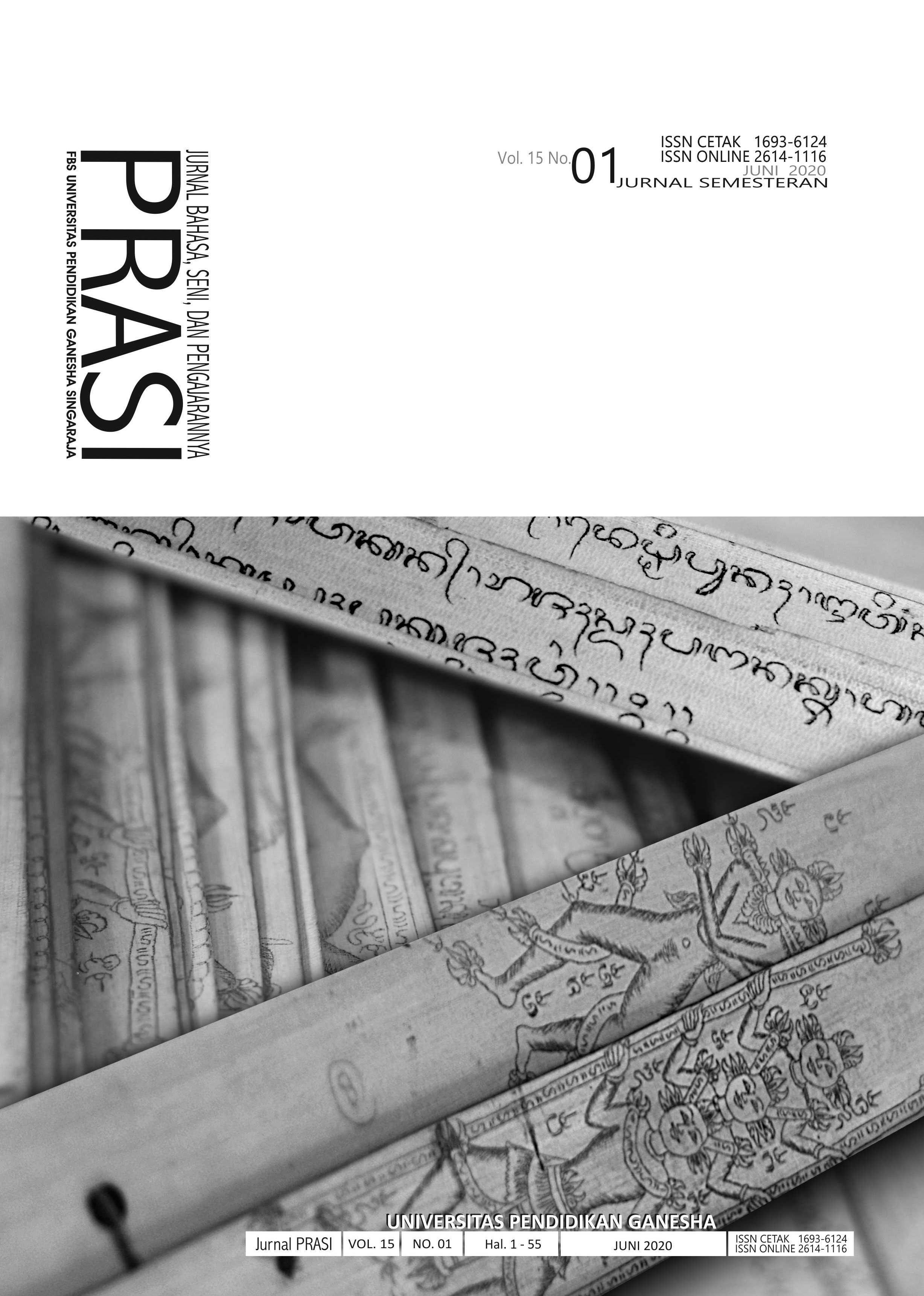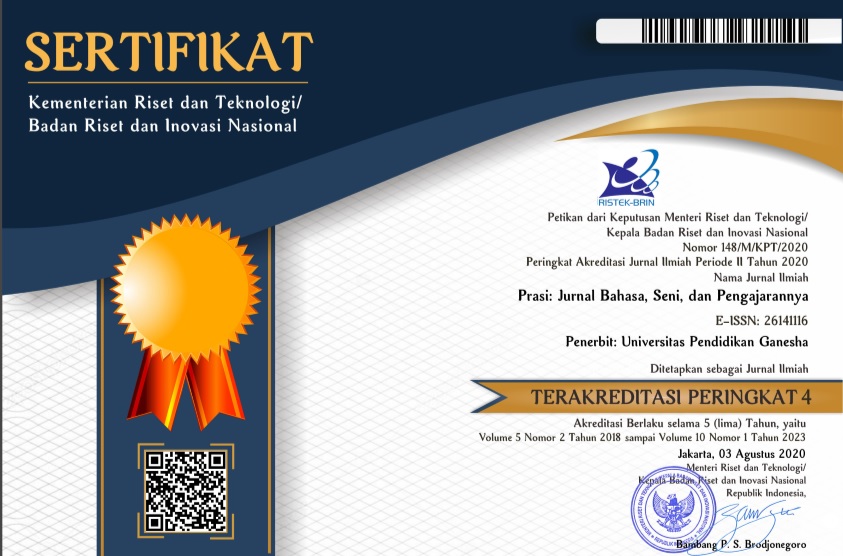PROBLEMATIKA PROGRAM KREATIVITAS MAHASISWA (PKM) DAN PROGRAM MAHASISWA WIRAUSAHA (PMW) PADA FAKULTAS BAHASA DAN SENI UNDIKSHA
DOI:
https://doi.org/10.23887/prasi.v15i01.24801Keywords:
Program Kreativitas Mahasiswa, Program Mahasiswa Wirausaha, soft skillAbstract
ABSTRAK
Program Kreativitas Mahasiswa (PKM) dan Program Mahasiswa Wirausaha (PMW) bertujuan untuk mengembangkan kemampuan soft skill dan aspek afektif, kognitif, dan psikomotor para mahasiswa. Program ini memberikan manfaat bagi para mahasiswa dan institusi. Banyak upaya telah dilakukan oleh Fakultas Bahasa dan Seni (FBS) Universitas Pendidikan Ganesha (Undiksha) dalam meningkatkan kuantitas dan kualitas PKM dan PMW. Namun dari data yang ada, kuantitas dan kualitasnya yang ada hingga saat ini masih sangat kurang. Dalam penelitian ini, penyebab kekurangan PKM dan PMW di FBS Undiksha diselidiki. Metode ADDIE (Analysis, Design, Development or Production, Implementation or Delivery, and Evaluations) diterapkan dari data yang diperoleh melalui metode wawancara dari 91 siswa FBS Undiksha. Hasil penelitian menunjukkan bahwa ada penyebab utama partisipasi dialami oleh para mahasiswa ketika bergabung dengan PKM dan PMW. Ada beberapa kendala yang dihadapi oleh para mahasiswa, seperti kesulitan dalam mendapatkan informasi tentang PKM dan PMW, pengumuman program yang mendadak, kesulitan dalam mendapatkan ide dan menulis, kesulitan dalam mendapatkan dosen pembimbing, dan kesulitan untuk menemukan tim.
Kata-kata kuci: Program Kreativitas Mahasiswa (PKM), Program Mahasiswa Wirausaha (PMW), soft skill.
ABSTRACT
Program Kreativitas Mahasiswa (PKM) and Program Mahasiswa Wirausaha (PMW), or student creativity program and student entrepreneurship program are to develop soft skills and student aspects such as affective, cognitive, and psychomotor. The program provides benefits for both students and institutions. A lot of efforts have been conducted by Fakultas Bahasa dan Seni (FBS) Universitas Pendidikan Ganesha (Undiksha) in increasing the quantity and quality of PKM and PMW. However, the quantity and quality are still a deficiency. In this study, the deficiency causes of the PKM and PMW in FBS Undiksha was investigated. The ADDIE (Analysis, Design, Development or Production, Implementation or Delivery, and Evaluations) was applied from the obtained data through the interview method from 91 students of FBS Undiksha. The results showed that the primary cause of deficiency was experienced by the students when joining the PKM and PMW. There were several obstacles encountered by students, such as the difficulty in getting information about PKM and PMW, the sudden announcement of the program, the stress in getting ideas and writing, the stress in getting the supervisors, and the difficulty to find the teams.
Keywords: student creativity program, student entrepreneurship program, soft skills
References
Apandi, Idris. (2018). Langkah Praktis Melakukan Penilaian Hots dalam Kompasiana. https://www.kompasiana.com/idrisapandi/5bedad11c112fe184b36be28/la. Diunduh 19 Mei 2020
Branch, Robert Maribe. (2009). Instructional Design: The ADDIE Approach. London: Springer.
Dikti. (2018). Pedoman Program Kreativitas Mahasiswa 2018.
https://belmawa.ristekdikti.go.id/wp/Pedoman-PKM-2018.pdf. Diakses pada 10 Februari 2019.
Putra, Anggara Pramana, dkk. (2018). Program Kreativitas Mahasiswa dan Implikasinyadalam Upaya Sustainable Empowerment. Jurnal: Ranah Research. Vol.1. No.1:18.
Undiksha. (2015). Rancangan Strategis (Renstra). Singaraja: Undiksha Press.
Widjajanti, Kesi. (2011). Model Pemberdayaan Masyarakat. Jurnal Ekonomi Pembangunan, Volume 12, No.1, Juni 2011: hal. 15-27
Downloads
Published
Issue
Section
License
Authors who publish with Prasi agree to the following terms:- Authors retain copyright and grant the journal the right of first publication with the work simultaneously licensed under a Creative Commons Attribution License (CC BY-SA 4.0) that allows others to share the work with an acknowledgment of the work's authorship and initial publication in this journal
- Authors are able to enter into separate, additional contractual arrangements for the non-exclusive distribution of the journal's published version of the work (e.g., post it to an institutional repository or publish it in a book), with an acknowledgment of its initial publication in this journal.
- Authors are permitted and encouraged to post their work online (e.g., in institutional repositories or on their website) prior to and during the submission process, as it can lead to productive exchanges, as well as earlier and greater citation of published work. (See The Effect of Open Access)


.png)
.png)









